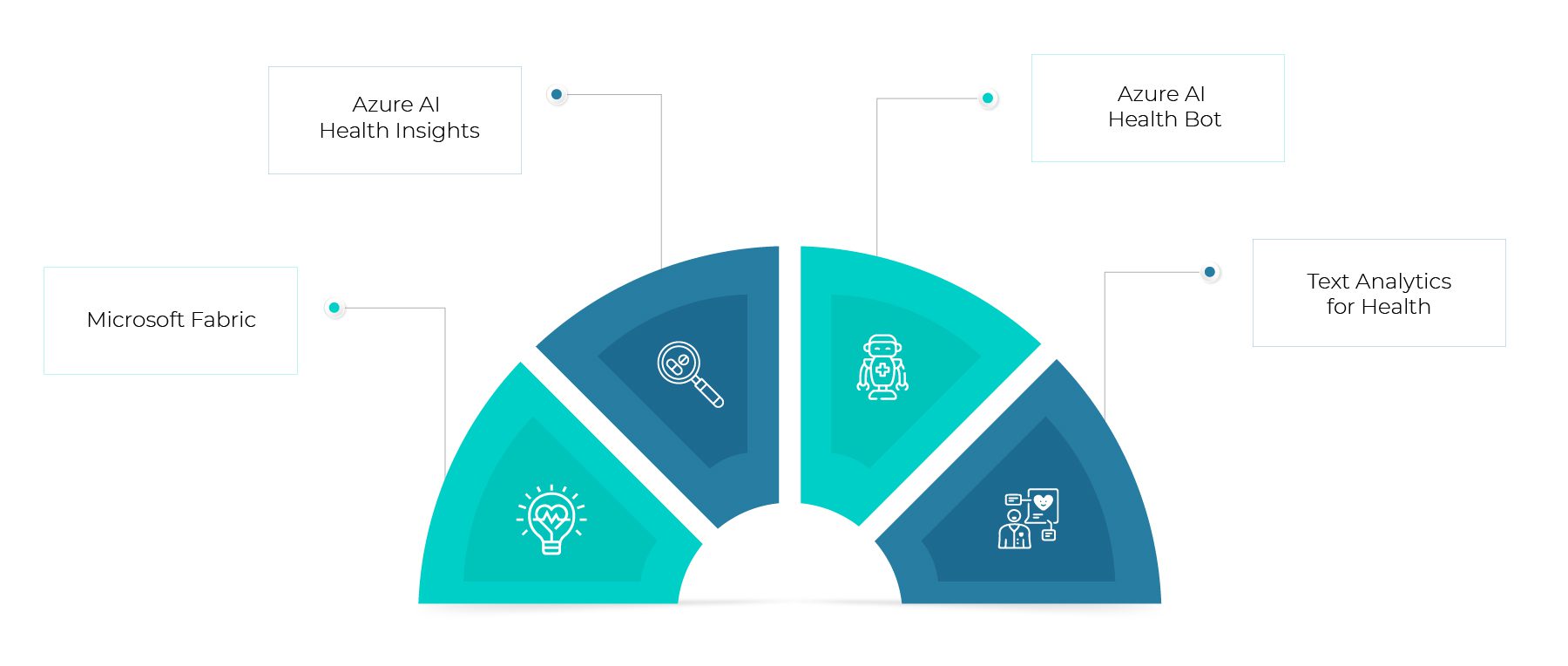Highlights:
- In the ever-expanding realm of healthcare, data isn’t just information—it’s the hidden gem that holds the key to transforming patient care and outcomes.
- Enter Microsoft Fabric and Azure AI solutions, the game-changers empowering healthcare organizations not just to gather data but to extract invaluable insights that drive informed, game-changing decisions.
- These solutions are not just tools; they’re revolutionaries poised to reinvent healthcare delivery as we know it, promising a future where care is not just efficient but meticulously personalized and incredibly effective.
- Here’s the catch: the journey starts with a crucial step—data migration. It’s the pivotal move that unlocks the true potential of Microsoft Cloud, paving the way for these transformative solutions to reshape the healthcare landscape.
In this Quick Byte:
Healthcare today encounters a range of challenges, many of which are no strangers to the spotlight. Take, for instance, the well-documented struggle Americans face in affording healthcare. Around 44% have had to skip medical care due to its steep cost. Equally recognized is the pressing need for a shift toward value-based care (VBC) across the industry. This model emphasizes improving both affordability and patient outcomes by compensating healthcare providers based on the results achieved for patients rather than solely the quantity of services provided.
While in retail, the mantra of “better, faster, cheaper” might hold, healthcare deals with stakes far higher than an eight-pack of socks demands an entirely different approach to innovation. To find solutions, we’ve got to first grapple with understanding these challenges.
The healthcare landscape is a tangled web of rising costs, crippling staffing shortages, and persistent health inequities. Not to forget the surge of healthcare data generated every day. As per statistics, the healthcare industry generates 30% of global data volumes. Now, imagine the mammoth task of managing and capitalizing on it. Additionally, the usability of this data raises ethical concerns and risks widening existing divides. The World Economic Forum highlights a staggering fact: hospitals generate about 50 petabytes of isolated data yearly—equivalent to roughly 10 billion music files. Astonishingly, a whopping 80% of this data is unstructured, and 97% of it remains untapped, locking away precious insights. Leveraging this data holds the potential to unearth crucial clinical and operational advancements, significantly impacting patients’ healthcare experiences. As we step into the AI era, the significance of data amplifies. Organizations recognize that a robust data strategy is the linchpin for AI’s true potential. Without it, they merely scratch the surface of what AI can achieve.
During the HLTH 2023 conference, Microsoft unveiled new data and AI solutions aimed at empowering healthcare organizations. These innovations prioritize enhancing patient and clinician experiences while concurrently ensuring efficient, cost-effective, and high-quality care delivery. These solutions, working in harmony, present healthcare organizations with a consolidated, secure, and ethical approach to their data and AI strategy. They enable these organizations to harness the extensive capabilities and reach of the Microsoft Cloud for Healthcare.
Bringing Together Data Management and Analytics for Enhanced Business Value and Improved Patient Care
Earlier this year, Microsoft revealed Microsoft Fabric—an all-encompassing AI-powered analytics platform designed to amalgamate various data and analytics tools, enabling organizations to unleash the potential of their data and pave the way for the AI era. Leveraging the capabilities of the Microsoft Cloud for Healthcare, they introduced the inaugural industry-specific data solutions within Fabric. These solutions integrate data and insights using a unified architecture and user experience tailored for the healthcare sector. These healthcare data solutions in Fabric streamline the intricate process of consolidating diverse and complex health data sources—such as text, images, and videos. They offer a secure and regulated avenue for organizations to access, analyze, and visualize data-driven insights seamlessly across their operations.
Microsoft Fabric and Azure AI Innovations Redefining Patient Care


Microsoft Fabric: With AI infused into every layer in Microsoft Fabric , they are committing to a future where every data professional can get more done faster. For healthcare organizations, it is empowering them with a comprehensive suite of capabilities that amalgamates data from previously segregated sources within the organization—spanning electronic health records (EHRs), Picture Archiving and Communication Systems (PACS), lab systems, claims systems, and medical devices. This solution harmonizes structured, unstructured, imaging, and medical device data into the Fabric data lake, employing open data standards like FHIR, DICOM, and MedTech services, thereby establishing a unified architecture. Further enhancing its flexibility, connectors, and converters simplify data transformation between formats and facilitate the creation of specific pipelines. This multimodal data foundation serves as a platform for standardized, scalable solutions, expediting the discovery of impactful clinical and operational insights to elevate patient care. Fabric cultivates a consolidated data environment conducive to building and deploying AI models and extracting valuable insights. Moreover, it offers standard capabilities such as Observational Medical Outcomes Partnership (OMOP) analytics, enabling clinical research, patient outreach analytics, and personalized patient engagement. Introducing a novel de-identification service, Fabric ensures the privacy of patient-protected health information (PHI) by employing machine learning models to extract, redact, or surrogate identifiers, enabling insight extraction from unstructured data like medical documents and clinical trial studies. Additionally, healthcare-specific pre-built classification rules, labels, and data glossaries within Microsoft Purview enable healthcare organizations to effectively govern, protect, and manage their entire data estate.
Azure AI Health Insights: Azure AI Health Insights, a cognitive service, furnishes clinicians and researchers with prebuilt models designed to analyze data and offer insights pivotal for informed decision-making during critical healthcare scenarios. Among these, three new models—currently in preview—come to the forefront:
- Patient Timeline: This leverages generative AI to extract crucial events like medications, diagnoses, and procedures from unstructured data, arranging them chronologically. This meticulous timeline offers clinicians a clearer, more accurate understanding of a patient’s medical history, enhancing the precision of care plans.
- Clinical Report Simplification: Utilizing generative AI, this model transforms intricate medical jargon into easily understandable language without compromising the clinical essence. This allows clinicians to communicate complex clinical information effectively, even with patients and others, facilitating comprehensive understanding.
- Radiology Insights: Offering quality checks, this model flags errors and inconsistencies within clinical documentation, ensuring accuracy. Moreover, it identifies follow-up recommendations and clinical findings, including measurements, recorded by radiologists, streamlining the interpretation process.
Azure AI Health Bot: Azure AI Health Bot furnishes readily available healthcare intelligence that can be tailored and seamlessly integrated into current workflows. It draws on responses sourced from a healthcare organization’s internal content while also utilizing generative AI to offer information from reputable sources like the National Institutes of Health and the U.S. Food and Drug Administration.
Text Analytics for Health: Text Analytics for Health, a language service within Azure AI, employs machine learning capabilities to extract and categorize crucial medical data from diverse unstructured texts. Recently unveiled industry open-source templates encompass population health, patient queries and answers utilizing Azure OpenAI Service, clinical trial patient cohorts, and large-scale historical data processing.
The Nexus of Data and AI Revolutionizing Patient Care
The synergy between data and AI in healthcare represents a transformative force. Their integration empowers healthcare professionals with comprehensive insights, enabling more precise diagnoses, personalized treatments, and proactive interventions. This not only elevates patient care and outcomes but also drives operational efficiencies, fostering a healthcare ecosystem geared towards continual improvement and innovation. The utilization of data and AI in healthcare is not just a technological leap; it’s a fundamental shift towards a more effective, patient-centered, and sustainable healthcare paradigm.
Northwestern Medicine, the leading integrated academic health system in Chicago, will utilize Fabric’s healthcare data solutions to merge clinical data from diverse sources. This integration aids in meeting regulatory requirements for data exchange while unlocking insights using data and AI. It aligns with their patient-centric approach, ensuring high-quality and timely care.
Arthur Health intends to employ Fabric to drive predictive care models in collaboration with Quisitive for the Ontario Workers Network (OWN). OWN, a network of provincial hospitals, including Ottawa Hospital, boasts experienced clinicians providing top-tier care to local workers.
SingHealth, Singapore’s most extensive public healthcare network, seeks to harness Fabric’s healthcare data solutions to fortify its foundational data infrastructure. This transformation aims to revolutionize healthcare delivery, enhancing care quality and services for the population and empowering individuals to manage their health and healthcare effectively.
In an ever-evolving healthcare landscape, Microsoft’s Azure emerges as a transformative power, democratizing healthcare access and reshaping our approach to patient well-being. These strides signal a promising, more accessible future for healthcare at large.
The Data Dynamics Advantage
Data migration serves as the foundational step for healthcare care providers adopting Microsoft Cloud and, subsequently, Data Fabric and their AI-based solutions, facilitating a seamless transition to modernized, cloud-based solutions. In healthcare, where vast amounts of sensitive patient information reside within legacy systems, migrating this data to the cloud is pivotal. Manual processes and budget constraints frequently hinder the progress of cloud initiatives. To surmount these challenges, organizations require automated, scalable solutions for transferring their data to the cloud.
This is where Microsoft, in collaboration with Data Dynamics, introduces the Azure File Migration Program—a transformative solution for enterprises keen on migrating their data to Azure at no cost. This partnership empowers organizations to seamlessly transition their unstructured files and object storage data to Azure, alleviating concerns about expenses or additional migration licenses. Our policy-based migration process not only mitigates risks but also maintains granular control over access and file security, preserving the integrity of your data. Through this program, customers can register their migration projects with Data Dynamics and commence the seamless movement of their data to Azure right away.
However, the synergy between Microsoft and Data Dynamics encompasses more than data migration. It champions intelligent data management across On-Premise, Azure, and Hybrid Cloud environments, bolstering overall efficiency and effectiveness. What truly distinguishes Data Dynamics is our all-encompassing UDM software designed to facilitate intelligent, data-driven migration to Azure, marking a departure from conventional lift and shift strategies towards the establishment of robust Cloud foundations. One standout feature is our petabyte-scale capability, specifically tailored for operations across Azure File, Azure Netapp, Azure Blob, and OneDrive, setting us apart from solutions geared toward smaller environments. Our commitment to enhanced data compliance and security is evident through our migration module, which supports sensitivity label management seamlessly integrated with Microsoft Information Protection and Azure Information Protection. Moreover, our geo-specific migration adheres to data sovereignty regulations, ensuring compliance with regional data requirements. Additionally, Data Dynamics does not hold enterprise data hostage. Our software empowers organizations with control and flexibility, ensuring that data remains accessible and usable without unnecessary restrictions.
With a modern enterprise focus, our unified data management software is purpose-built to scale and adapt to the complexities of hybrid, multi-cloud, and legacy environments. Unlike competitors relying on multiple point solutions, Data Dynamics offers a unified platform for enterprise data management that scales seamlessly to meet end-to-end requirements. This eliminates data silos and enhances efficiency, providing our clients with unparalleled flexibility and future-proofing, aligning seamlessly with the evolving needs of the modern business landscape.
To delve deeper into the world of Data Dynamics and discover how our software can facilitate seamless data migration, efficient data management, and cost optimization within Azure, please visit our website at https://www.datadynamicsinc.com/microsoft/. Additionally, you can reach out to us at solutions@datdyn.com or connect with us via phone at (713)-491-4298 or +44-(20)-45520800. Allow us to become your trusted partner on your cloud migration and data management journey.






